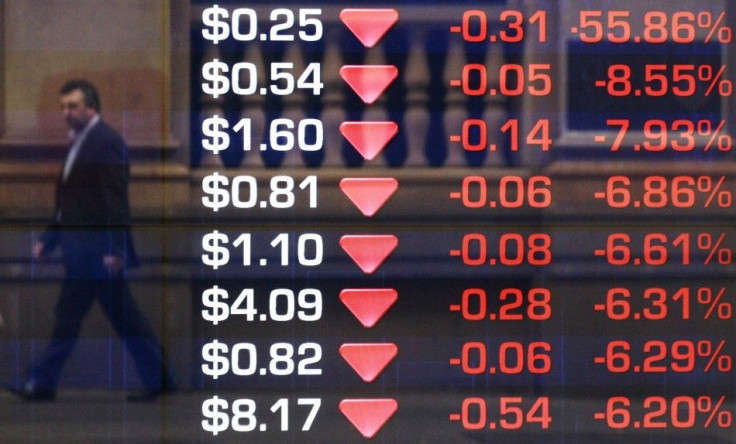Australian Stock Market Report – Afternoon October 10, 2014

Losses worsen in afternoon
Local shares extended their losses after lunch, falling for the fourthtime this week and hitting a fresh eight-month low. The All Ordinaries Index (XAO) slumped by 2 per cent, slipping below 5200.0 for the first time since February and making it the worst session of the year.
US markets recorded their fourth biggest decline of the year overnight following concerns of softer world growth. Overnight Germany's leading economics institute said it expects growth of just 1.3 per cent this year compared to previous forecasts of 1.9 per cent. Earlier in the week the International Monetary Fund (IMF) also downgraded estimates for Germany.
Stocks involved with commodities were the worst performers today with BHP Billiton (BHP) down 2.7 per cent while the smaller Rio Tinto (RIO) slipped by 3 per cent. Smaller iron ore producers like Atlas (AGO) were also sold following a 4 per cent rise on Thursday.
The banks dropped by 1.9 per cent, with National Australia Bank (NAB) down by a more modest 1.6 per cent. Telstra's losses worsened (TLS) to 2 per cent.
This has been a tough week for the Australian sharemarket with a 1 per cent improvement yesterday the only bright spot. Energy stocks were the hardest hit slumping 4.6 per cent following a slump in the oil price to a near two-year low overnight. Miners fell by 3.3 per cent this week, industrials, consumer staples and discretionary fell by 2.8 per cent, banks slumped by 1.8 per cent and the telcos slipped by 2 per cent. The utilities and property trusts were the only sectors to end flat.
The Australian dollar had a quiet session and currently buys around US$0.877. Yesterday's excitement following the employment report and US concerns of the greenback's strength has died down.
At the close, 2.08bn shares were traded worth a significant $5.8bn. 219 stocks rose, 751 fell and 322 ended unchanged.
On the economic front, the number of new home loan commitmentsfell by a worse than expected 0.9 per cent in August. CommSec Chief Economist Craig James said that "Interest rates are at record lows and we haven't been building enough homes to house our growing population. So it is hardly a surprise that demand for homes is at record highs. But high prices are inducing some caution by those buying homes with the intention of living in them. And investor housing activity is also expected to soften as record approvals to build new homes eventually translate to more homes on the market for either rent or for sale."
Tonight, G20 meetings begin while the IMF meetings will kick-off tomorrow. Federal Reserve official Charles Plosser will deliver a talk at 12am AEDT.
Next week locally, updates on lending, credit card debt, business confidence and talks by Reserve Bank officials will be in focus. In the region trade and inflation updates for China will be key while further abroad, updates on retail spending, business inflation and production will be out in the US.
[Kick off your trading day with our newsletter]
More from IBT Markets:
Follow us on Facebook
Follow us on Twitter
Subscribe to get this delivered to your inbox daily




















